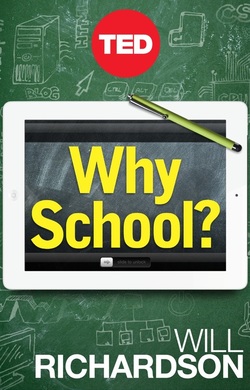
After reading this book, I started a short project with my fifth graders. I wanted to see how they could find information online without my help on something that would be meaningful. I had them think about what they would like to study in college and choose three potential colleges they could attend for that degree. I told them anything they needed to ask me could be answered on the internet. If they didn’t know what to study, I told them to look up it up: “what should I study in college?” If they didn’t know what colleges had the degree programs they wanted, I told them to look up their questions. After a few minutes of students getting used to the fact that they couldn’t ask me questions, it was silent. Students were looking up anything and everything that would help them. I was monitoring their searches and everyone was on task and looking up different degrees and colleges. I believe this is a perfect example of Richardson’s point. I don’t have to give the students a list of degrees to choose from and I don’t have to give the students a list of colleges to choose from. They can use technology to find any answers they need. Instead of the focus being on just answering the question, it moves to learning the process of finding the answers on their own. One student ended up live chatting with a representative from an online university who helped her find the right program for her. I was thoroughly impressed.
Richardson outlines six ideas that educators should consider to make the education reform become a reality. Teachers should share their ideas to hang on a “virtual wall” (Richardson, 2012, Share everything section, para.1) to not only spread the wealth of experience with each other but learning to share will help us teach our students how to share. Teachers also should work to allow students to create or discover their own learning instead of delivering it to them (Richardson, 2012). Teachers need to engage with different people in the world, become “master learners” and have students produce things that would be available and useful for real audiences. Lastly, Richardson suggests that teachers transfer the power of learning to the students so that it is meaningful and lasting for them. Richardson (2012) states “Don’t teach my child science; instead teach my child how to learn science - or history or math or music” (Transfer the power section, para. 4).
All of these ideas would move education away from what it has always been. Students have always come to school to learn what the teacher wants them to and are considered successful if they can reproduce what they learned. That will be the biggest struggle. I can, and already do, share things with all my colleagues at my site. I have not started to share using a public website, but I am willing to begin. I can also commit to allowing students to create their own learning. This is the biggest change that comes with technology and will be one of the ones that most teachers struggle with. I don’t know if we will be able to fully give up the old way of teaching until some of the expectations for testing are lifted. However, when there is time available I will add projects to my curriculum that allow students to learn how to learn instead of simply learning what I tell them. I am constantly learning new things through technology and may not be at the level of a “master learner” yet, but I am continuing to grow in this manner.
The last three ideas that Richardson outlines that I think will be the biggest struggle for me are engaging with “strangers” to become a more global learner, have students produce work that is meant for real audiences and transferring the power. Right now, with all the new curriculum that has been developed and adopted by my district, I don’t think outside of my own classroom and district on certain things. I understand that it would be beneficial because you can use others’ expertise to add to your teaching, but it’s difficult to think at that level. Having students produce work that is meant for real audiences would also be a struggle. Mostly because I wouldn’t know where to begin. Creating projects in which students can collaborate and create a product together at their grade level is difficult enough, but coming up with a project that would be for audiences outside school is the next level. I’m not saying I wouldn’t or couldn’t try it, I just don’t know where to start. Lastly, transferring the power of learning to the students is a fantastic idea in theory but with all the pressure teachers face with testing and API scores, we have the responsibility to guide learning and make sure it follows a certain path. I would like to continue to grow in all these areas, but feel unsure about how well the ideas will be received by administrators.
Resources
Mobile Technology Fact Sheet. (n.d.). Retrieved June 4, 2015,
from http://www.pewinternet.org/fact-sheets/mobile-technology-fact-sheet/
Richardson, Will. ( 2012). Why School? [Kindle Cloud Reader] Retrieved from Amazon.com